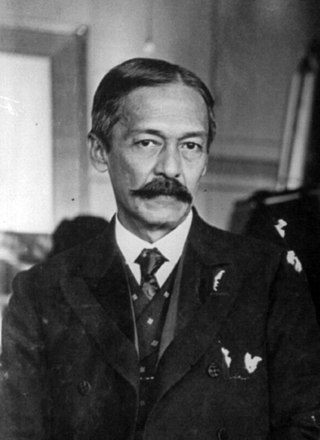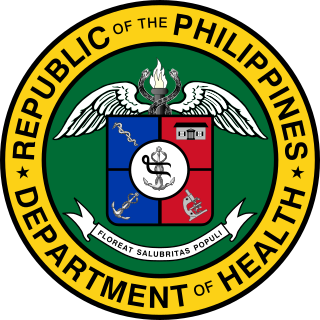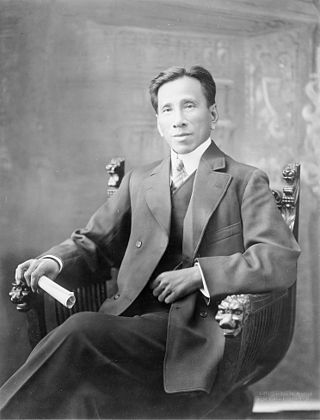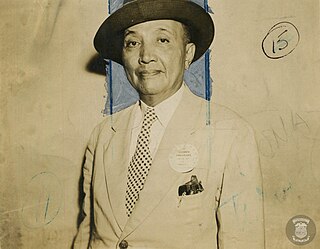The governor-general of the Philippines was the title of the government executive during the colonial period of the Philippines, governed by Mexico City and Madrid (1565–1898) and the United States (1898–1946), and briefly by Great Britain (1762–1764) and Japan (1942–1945). They were also the representative of the executive of the ruling power.

William Cameron Forbes was an American investment banker and diplomat. He served as governor-general of the Philippines from 1909 to 1913 and ambassador of the United States to Japan from 1930 to 1932.

Session Road is a six-lane 1.7-kilometer (1.1 mi) major road in Baguio, Philippines. The entire road forms part of National Route 231 (N231) of the Philippine highway network.

Benito Cosmé Legarda y Tuason was a Filipino legislator who was a member of the Philippine Commission of the American colonial Insular Government, the government's legislature, and later a Resident Commissioner from the Philippine Islands to the United States Congress.

The Nevada Senate is the upper house of the Nevada Legislature, the state legislature of U.S. state of Nevada, the lower house being the Nevada Assembly. It currently (2012–2021) consists of 21 members from single-member districts. In the previous redistricting (2002–2011) there were 19 districts, two of which were multimember. Since 2012, there have been 21 districts, each formed by combining two neighboring state assembly districts. Each state senator represented approximately 128,598 as of the 2010 United States census. Article Four of the Constitution of Nevada sets that state senators serve staggered four-year terms.

Epifanio de los Santos y Cristóbal, also known as Don Pañong or Don Panyong, was a notable Filipino historian, journalist, and civil servant. He was regarded as one of the best Filipino writers and a literary genius. He also entered politics, serving as a member of the Malolos Congress from 1898 to 1899 from Nueva Ecija and later as governor of Nueva Ecija from 1902 to 1906. As a lawyer, he was named as the district attorney of San Isidro, Nueva Ecija in 1900 and later as fiscal of the provinces of Bulacan and Bataan. He was named as an assistant technical director of the Philippine Census in 1918. He was appointed Director of the Philippine Library and Museum by Governor General Leonard Wood in 1925, serving until his death in 1928.

The Department of Health is the executive department of the government of the Philippines responsible for ensuring access to basic public health services by all Filipinos through the provision of quality health care, the regulation of all health services and products. It is the government's over-all technical authority on health. It has its headquarters at the San Lazaro Compound, along Rizal Avenue in Manila.

The history of the Philippines from 1898 to 1946 is known as the American colonial period, and began with the outbreak of the Spanish–American War in April 1898, when the Philippines was still a colony of the Spanish East Indies, and concluded when the United States formally recognized the independence of the Republic of the Philippines on July 4, 1946.
The Philippine Commission was the name of two bodies, both appointed by the president of the United States, to assist with governing the Philippines.
The 2nd Philippine Legislature was the meeting of the legislature of the Philippines under the sovereign control of the United States from March 28, 1910, to February 6, 1912.
The 3rd Philippine Legislature was the meeting of the legislature of the Philippines under the sovereign control of the United States from October 16, 1912, to February 24, 1916.

The Taft Commission, also known as the Second Philippine Commission, was established by United States President William McKinley on March 16, 1900, following the recommendations of the First Philippine Commission, using presidential war powers while the U.S. was engaged in the Philippine–American War.

The Mansion, also known as Mansion House, is the official summer palace of the president of the Philippines, located in the summer capital of the country, Baguio, and situated around 5,000 feet (1,500 m) asl in the Cordillera Central Range of northern Luzon.

Rafael Palma y Velásquez was a Filipino politician, Rizalian, writer, educator and a famous Freemason. He was a senator from 1916 to 1921 and was the fourth president of the University of the Philippines.

The Insular Government of the Philippine Islands was an unincorporated territory of the United States that was established in 1902 and was reorganized in 1935 in preparation for later independence. The Insular Government was preceded by the United States Military Government of the Philippine Islands and was followed by the Commonwealth of the Philippines.

Teofisto "Tito" Tayko Guingona Jr. is a Filipino politician and diplomat who served as the 11th Vice President of the Philippines from 2001 to 2004, during the first term of President Gloria Macapagal Arroyo. Born in San Juan, Rizal, Teofisto is a graduate of Ateneo de Manila University, where he was a working student.

William Edward Parsons was an architect and city planner known for his work in the Philippines during the early period of American Colonial Period. He was a consulting architect to the Insular Government of the Philippine Islands from 1905 to 1914, and designed various structures, most notably the Gabaldon School Buildings.

Pablo Ocampo y de León was a Filipino lawyer, nationalist, a member of the Malolos Congress, inaugural holder of the office of Resident Commissioner from the Philippine Islands to the United States Congress alongside Benito Legarda and a member of the 2nd Philippine Legislature. He gave his service to his country and helped to bring about the peaceful transition of the Philippines from being a colony of Spain for more than 300 years to what will later become the American Commonwealth of the Philippines.
Ambrosio Flores y Flores was a Filipino general in the Philippine Revolution and the first governor of the province of Rizal.

A special election for the seat of Cavite's at-large district in the Philippine Assembly, the lower house of the Philippine Legislature of the Insular Government of the Philippine Islands, was held on January 19, 1909. This was triggered due to the appointment of the incumbent Rafael Palma as a member of the Philippine Commission. Emiliano Tría Tirona won the special election.
















